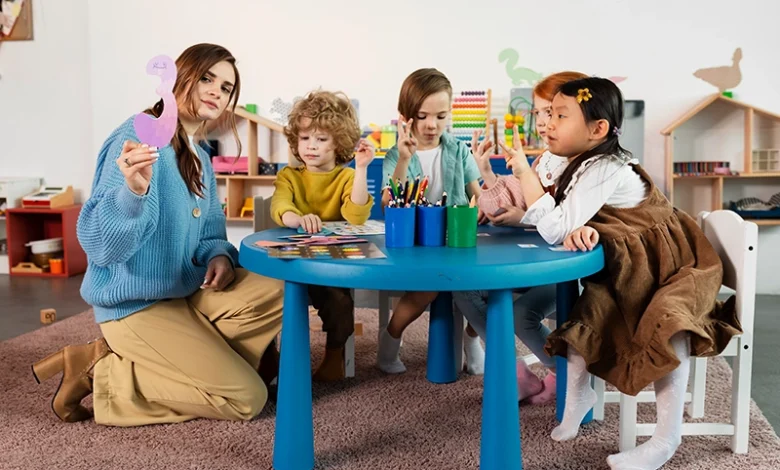Why Mid-Term Playgroup Admissions Benefit Your Child

As parents, we all aim to make informed decisions that will favour our children’s future. One of the most important decisions that comes in the early years of their age is when and where to start their education. Many parents follow the traditional academic calendar, enrolling their child in the initial days of the school year, mid-term admissions for playgroups are beneficial for various reasons and this should not be ignored. This blog discusses the advantages of mid-term admissions to playgroup and why it could just be the right time to begin the child’s early education journey.
Easier Transition into Formal Education
The transition into formal education can be difficult for young children, especially when they are suddenly placed in a large, unknown group during the initial days of the school year. Mid-term admissions can make this transition smoother. Instead of entering a completely new environment with many new faces, your child will join an existing group where the dynamics are already established. This can reduce the anxiety and stress often associated with starting school.
Moreover, the mid-term allows children to slowly and gradually adjust to the structure and routines of a classroom setting. They can easily understand the expectations and social norms of the school environment at a gentler pace, which can develop their confidence and help them build the social skills required for future success in a more formal educational setting.
Personalized Learning Experience
One of the major advantages of putting your child in a playgroup during the mid-term is the chance he will be exposed to a more personalized mode of learning. Since admissions usually range up to mid-terms with only a few students, the teachers get enough time and attention to focus on each child individually. This small number allows the teachers to give adequate time for activities and lessons tailored in keeping with each child’s requirements, learning style, and developmental stage. This personalized approach ensures that your child is not pressured and can easily merge into the playgroup.
For instance, if your child is shy or takes a little longer to adjust to a new environment, the smaller class and individual attention can make him or her much more comfortable. This could have a huge effect on how they approach learning in a way that feels safe and supportive.
Crucial Development of Key Skills
The mid-term admissions to the playgroup offer a very good opportunity for the child to develop the most vital skills in a very important part of their growth. Playgroups are specially designed to develop creativity, fine and gross motor skills, language skills, and problem-solving ability through games. Thus, by admitting your child in mid-term, they will still be exposed to these, hence not missing out on anything.
Indeed, playgroup activities consist mostly of art projects, storytelling, and physical play, which all aid in developing cognitive and motor skills. Furthermore, such activities give children the chance to express themselves creatively, critically, and self-wise in a non-judgmental environment. This exposes your child to the learning experiences offered at the playgroup early enough to set a good foundation for future academic success.
Enhanced Social Interaction Opportunities
In early childhood education, Social interaction is important for a child’s growth. Playgroups provide a child with an opportunity to socialize, where he/she will learn to be with his peers, cooperate, share, and develop compassion. If you get the child into the mid-term admission, he or she will get all the benefits associated with socialization without getting overwhelmed by a large number of children coming in one go.
The group already established at the playgroup provides your child with an opportunity to join a community that can make your child feel included and valued. This is especially good for children who are perhaps more introverted or have had little experience in groups previously. The already-established social groups offer a supportive environment where your child can create friendships and develop social skills at their own pace.
Flexibility
Life is full of changes that sometimes occur without any parameters of the traditional academic year. Due to a change in working schedules, relocation, or preference, mid-term admission offers flexibility to start your child’s education at the most favourable time for your family.
It simply means that you do not have to wait for the beginning of a new year before you have your child enrolled in the playgroup. You can take advantage of mid-term admission so that your child gets started on their educational journey on time and there is no form of unnecessary delay since your child may have reached such a stage in his development.
A Low-Pressure Environment for Catching Up
If your child has never had any structured learning environment, then admission during the middle of the year offers him/her a chance to catch up without any pressure to keep pace with peers who started earlier in the year. Teachers in mid-term admission groups often remember that students usually come from different backgrounds and are able to help each child acquire the kind of skills and knowledge needed at their own pace.
This low-pressure environment can be helpful especially for those children who need more time to adjust to new environment. It allows them to build self-confidence without any pressure from competition or comparison and provides an excellent platform for developing learning skill that will stand them in good stead throughout their academics.
Conclusion
Mid-term admission to the playgroup may benefit your child in various ways: personalized attention, more social interaction, an easy transition to formal education, and various skill development. In addition, flexibility to adjust to your family’s needs and a low-pressure environment for your child to grow well are also provided. By choosing mid-term admission, you are being very considerate and practical about the nourishing and effective early education of your children, thereby placing them on the threshold to success in their future academic endeavours.





